Iranian Filmmakers Call For Inquiry Into Regime-Backed Oscars Submission

The Independent Filmmakers Association of Iran (IFMA) has requested an independent inquiry into the selection of next year's Oscars nomination.

The Independent Filmmakers Association of Iran (IFMA) has requested an independent inquiry into the selection of next year's Oscars nomination.
The IFMA sent an official letter to the Oscars Academy regarding the submission of The Night Guardian by Reza Mirkarimi as Iran's entry for the prestigious awards ceremony, objecting to the involvement of the Farabi Cinema Foundation, a governmental entity,.
"The representative of Iran's state cinema for participation in the 2024 Oscars ceremony has been selected and introduced by the Farabi Cinema Foundation, which is a state entity affiliated with the oppressive regime of Iran," states the letter.
The IFMA's letter drew attention to the oppression faced by independent filmmakers in Iran over the past year, citing arrests, interrogations, and threats. The Farabi Foundation has stated its coordination with security and intelligence agencies.
The IFMA is calling for the establishment of a selected group to review and introduce independent Iranian films for consideration at the Academy Awards next March, the ceremony held annually in Los Angeles. The association has also submitted a list of proposed works for the Oscars Academy's consideration.
Iran has achieved success at the Oscars in recent years, winning awards for "A Separation" in 2011 and "The Salesman" in 2016, both directed by Asghar Farhadi.
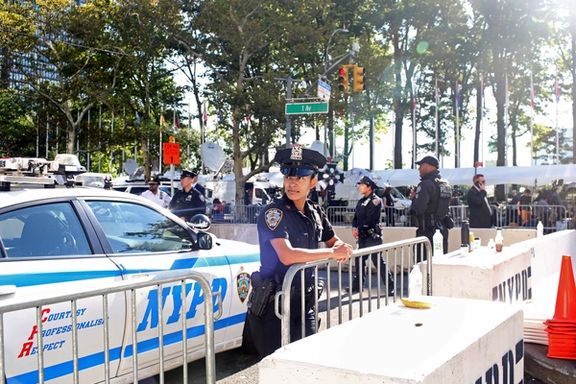
The entourage of Iran’s president attacked, harassed and insulted Iran International journalists covering Ebrahim Raisi’s stay in New York.
In the latest incident on Wednesday, an official from Raisi's delegation attacked Iran International correspondent Kian Amani outside the Millenium Hilton New York One UN Plaza Hotel.
The official tried to grab Amini’s cellphone as he was capturing footage of them exiting the hotel. The hotel's security team finally intervened and halted the aggressor.
In another encounter, an official identified as Reza Naghipour – who ironically accompanied Raisi as a protocol coordinator -- was asked by Amani about his name and credentials. Amani also tried to ask questions about the protesters who were killed during the regime crackdown on dissent last year. But instead of replying or even refraining from answering, Naghipour started to threaten the reporter, telling him that he “should be trembling with fear until the end of his life” because he works for dissident media.
Raisi’s team in New York had a repertoire of pre-planned strategies to avoid answering questions from media outlets critical of the regime. As soon as a reporter approached them with challenging questions, Raisi’s men started filming the reporter as they embarked on a barrage of unrelated questions to and accusations of treason to intimidate the reporter.
The encounters by Raisi’s delegation have drawn countless reactions by other journalists, human rights activists and even media inside Iran. Earlier this year, Iran International's offices in London were forced to relocate to Washington after repeated threats from the IRGC forced the UK's highest security services to admit they were no longer able to safeguard the lives of the reporting team.
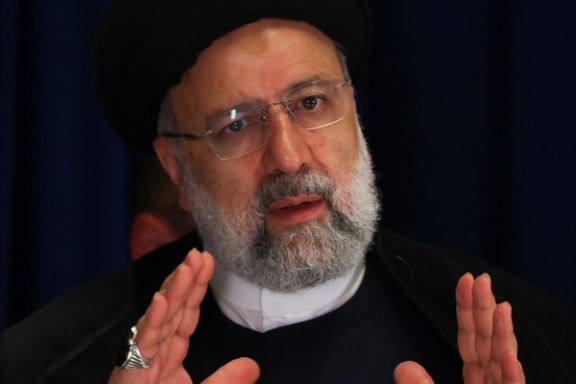
Activists, such as Ladan Boroumand, the co-founder of Abdorrahman Boroumand Center for Human Rights in Iran -- praised Iran International reporters for refusing to allow "the false narrative of the regime to become dominant”.
The composition of the entourage has raised serious questions as to how they were granted visas as part of its ‘diplomatic delegation'. Navid Mohebbi, a policy director with the National Union for Democracy in Iran think-tank, said, “These individuals should not have been granted entry in the first place" calling the entourage "thugs harassing journalists".
Recently-sanctioned Tasnim news agency, affiliated with the Revolutionary Guards, celebrated the circus created by the entourage behavior, publishing a video of one such case of harassment, boasting that “Iran International’s journalist fled in such a hurry that he didn't even turn back to pick up his headphones!”
Kasra Aarabi, with the United Against Nuclear Iran advocacy group, shared the video of the physical assault on Iran International’s Amini, saying, “This is what happens when you grant a mass murdering president and terrorist entourage entry to the West.”
One of the controversial figures who accompanied Raisi was a leader of a government vigilante mob who carried out the 2011 storming of the British embassy in Tehran. Now he is an advisor to the culture minister.
Moderate Iranian news website Rouydad 24, also criticized the selection of Raisi’s companions. Instead of ministers and high-ranking officials, Raisi’s team is comprised of “odd and peculiar people” who were tasked with “stopping foreign-based Persian-language media by shouting,” the media outlet said.
“If we look at President Raisi's agenda in New York, it appears more like a publicity campaign, and it probably won't yield any significant results,” Rouydad 24 said, pointing out that “What stands out most in President Raisi's trip to New York is the absence of an 'economic team' in his delegation, replaced instead by a group of 'slogan-shouting' individuals.”
Saman Arbabi, an Iranian-American journalist mainly known to Iranians as a co-creator and co-host of Voice of America's satirical television shows Parazit, released a video about his encounter with some of Raisi’s so-called ‘diplomatic delegation.’ He said when he saw how Raisi’s men attacked them when they sought to film them in an event at their New York hotel so “angrily and violently,” he tried to imagine the level of brutality during regime crackdown on protesters in Iran.
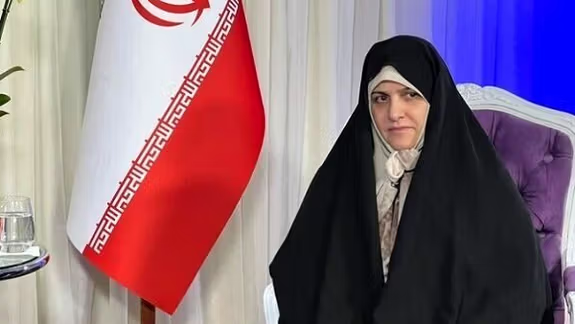
Despite months of women-led protests in Iran fighting systematic oppression, President Ebrahim Raisi’s wife claims women in Iran are content and do not seek equal rights.
In her first ever interview with a US media outlet, Jamileh Alamolhoda spoke to Newsweek, totally disregarding the last year of violent women-led uprising, dubbed Woman, Life, Freedom, which followed the death in morality police custody of 22-year-old Mahsa Amini.
As if there were no such uprising, she told Newsweek: "Women in Iran have not fought for their rights because they already enjoy their rights and that is due to the preservation of their dignity in society by men.
"The feminist movement from other parts of the world has also not found its way in Iran, and that is primarily due to the fact that it is inclined toward violence. As opposed to that, women in Iran prefer tranquility rather than being exposed to violence through the feminist approach."
The bizarre interview from Alamolhoda, the daughter of the hardline ultra conservative Friday Imam of the religious city of Mashhad, Ahmad Alamolhoda, comes amid a propaganda campaign being waged by the couple, which has also seen Raisi claim that women enjoy "unparalleled" rights in Iran, and denying the regime's race to nuclear armament.
It also came while new legislation to oppress hijab rebels was passed in parliament. The 'hijab and chastity' law was approved Wednesday, and will see even stricter crackdowns than are in place already. Over the last year, women refusing to wear the mandatory hijab have faced bans from public places, education, shops and malls, and have had severe punishments including fines and imprisonment.
The US-based Human Rights Activists News Agency (HRANA) has described the situation of women in Iran as “dire”. Since last year's unrest, at least 2,003 women were reprimanded in different ways, according to the rights group, including being summoned to police, for flouting the hijab.
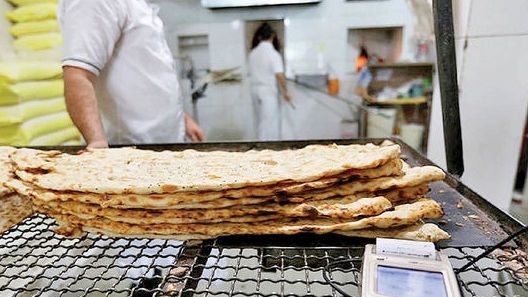
Faced with an apparent financial crunch to subsidize bread, the Iranian government is gradually raising prices, a move that can have both political and inflationary repercussion.
To avoid public blame and anger the government is trying to redirect the responsibility to provincial officials, although the central government would remain the main decision maker.
Iran's economy minister Ehsan Khanzoudi said on Wednesday that provincial authorities are now authorized to decide the prices of various types of bread, always set nationally before, “based on local circumstances”.
Earlier in September Government Spokesman Ali Bahadori-Jahromi had said in a televised interview that “the government has no plans to increase the price of bread” but added that provincial authorities in the future would be deciding the price of bread with the “approval of the interior ministry.”
Khandouzi also confirmed that provincial authorities need the approval of the interior ministry for increasing the price of bread in their respective provinces and added that the government will “specifically supervise bread prices.”.
Since Iran reduced subsidies for food and medicine last year, the government had repeatedly vowed not to increase bread prices. In May 2022 Khandouzi had stated that an increase in the price of bread was “the President’s redline” and other officials had repeated his promise of keeping the price of bread steady.
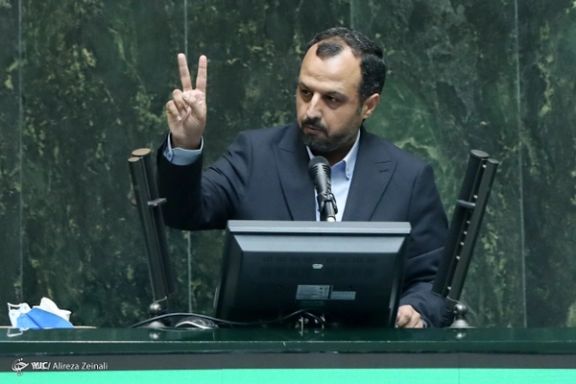
The government of President Ebrahim Raisi appears to be delegating the pricing of bread to provincial authorities to minimize criticism of its dismal economic performance including skyrocketing food prices analysts say. Prices rose as much as 100 percent in the past year for ordinary food items.
In early August after weeks of contradictory statements and denials, the government finally confirmed that bread prices had increased in 13 provinces by around 40 percent.
Analysts say the capital Tehran and Tehran Province, the most populous in the countrywith a population of over 13 million, were spared so far for political reasons including possibility of protests.
In the past few days, the price of Sangak, a popular flatbread weighing around 450g, rose by 50 percent from 20,000 rials to 30,000 (around 7 cents) in Tehran and surrounding regions due to a drop in the flour subsidy allocated to bakeries.
Bread prices in Iran might seem cheap by world standards, but any increase in the price of bread can hugely affect impoverished households given that bread is the main staple in Iranians’ diet.
Iranians are the second biggest bread consumers in the world with annually 160kg (350 lb) per person after Turkish consumers with 199.6 kg (440 lb) per person.
Bread consumption in Iran has risen by ten kilos in the past ten years due to higher cost of living that has made rice less affordable to many Iranians, particularly the three lowest-income percentiles.
Iran's food inflation rate, according to World Bank figures in June, stood at 78 percent, placing the country in the fifth place in the world after Venezuela (426%), Lebanon (350%), Argentina (115%), and Zimbabwe (102%). In April Iran had ranked fourth among the countries with the highest food inflation with a food inflation rate of 71 percent.
On May 1, 2022, the parliament voted to allow the government to scrape an annual $10-14 billion subsidy for essential food and medicine despite warnings of higher inflation, which already stood at around 40 percent, and hardship for the most vulnerable. This led to a ten-fold increase in the price of flour.
The government of President Raisi then introduced a “smart plan” to continue the bread subsidy and issued digital cards that have to be used at the time of purchase, arguing that the plan would prevent the smuggling of subsidized flour and bread to neighboring countries where they sold at much higher prices.
Earlier in June the Bakers’ Union revealed that subsidized flour allocations to some bakeries had dropped by more than half their quota. Bakers say despite the lower cost of subsidized flour, other production costs (labor, other ingredients including yeast and oil) have increased, and their sales have dropped so much in the past year that they are not able to make a profit even by using subsidized flour.
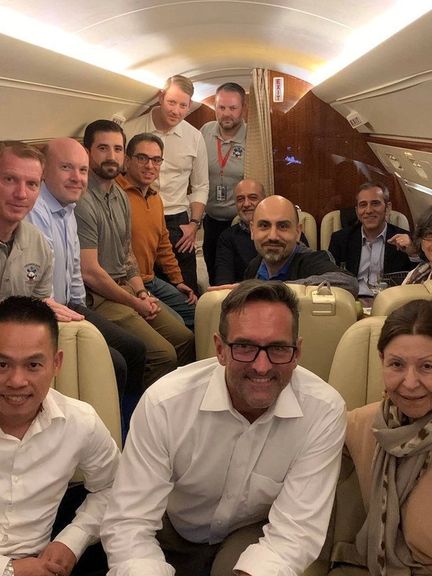
Iran's regime has revealed the identities of two American prisoners it recently released along with five known hostages as part of a swap arrangement with Washington.
According to Nour News, which is linked to Iran's Supreme National Security Council, the previously unnamed prisoners are Reza Behrouzi and Fakhr al-Sadat Moeini, who had chosen to remain anonymous.
“While US government was hiding pictures and identities of two prisoners released from Iran, National Security Advisor Jake Sullivan published their photos,” wrote Nour News.
The two individuals, along with Emad Sharghi, Siamak Namazi, and Morad Tahbaz, were released on Monday as part of the agreement between Tehran and Washington, which also included $6 billion blocked in South Korea due to US sanctions.
The daughter of Jamshid Sharmahd, a German-Iranian, and a US permanent resident currently facing the death penalty in Iran, called upon reporters and US lawmakers to investigate the issue of these two prisoners.
She posed several questions, seeking information about their connection to the US, their activities in Iran, the reasons for their imprisonment, and the circumstances surrounding their release. She also questioned why these individuals received expedited treatment from the State Department, contrasting it with the extended captivity of others in Iran for years, such as her father Jamshid Sharmahd.
Sharmahd, a 68-year-old software developer and California resident, was abducted during a visit to the United Arab Emirates in 2020 and forcibly taken to Iran. He was subsequently sentenced to death by on charges of "spreading corruption on Earth," a verdict that Amnesty International has already denounced as a sham, and his family vehemently disputes the allegations against him.
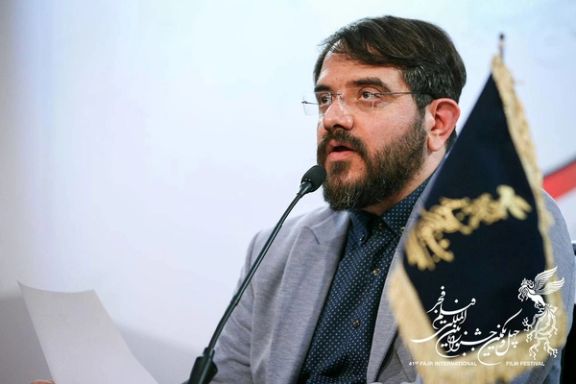
A leader of a government vigilante mob who carried out the 2011 storming of the British embassy in Tehran is now accompanying Iran's president during his visit to the United States.
Mojtaba Amini is also the producer of a TV series that has been criticized for glorifying the imprisonment of dual nationals and journalists.
Amini's producing of the Gando TV series was aimed to undermine the administration of former President Hassan Rouhani while receiving praise from supporters of Supreme Leader Ali Khamenei.
Members of President Hassan Rouhani's administration, including Foreign Minister mohammad Javad Zarif, protested the series and even wrote a letter of complaint to Khamenei, requesting its cancellation.
Despite the protests, a second season of the series was produced. The first season had drawn inspiration from Khamenei's repeated warnings about the "enemy infiltration" of the nuclear negotiating team.
Gando can be seen as a reflection of the complex power dynamics within the Islamic Republic. Despite the presence of an Intelligence Ministry, the IRGC's Intelligence Organization was formed in 2009 and now holds significant influence, if not more than the ministry. Gando was evidently intended to undermine the Intelligence Ministry and Rouhani's government.
In June, Mohammad Mehdi Esmaeili, Iran's Minister of Culture, appointed Mojtaba Amini as his advisor. Amini also served as the secretary of the 41st edition of the annual International Fajr Film Festival in 2021, a significant event in the Iranian cinema scene.






